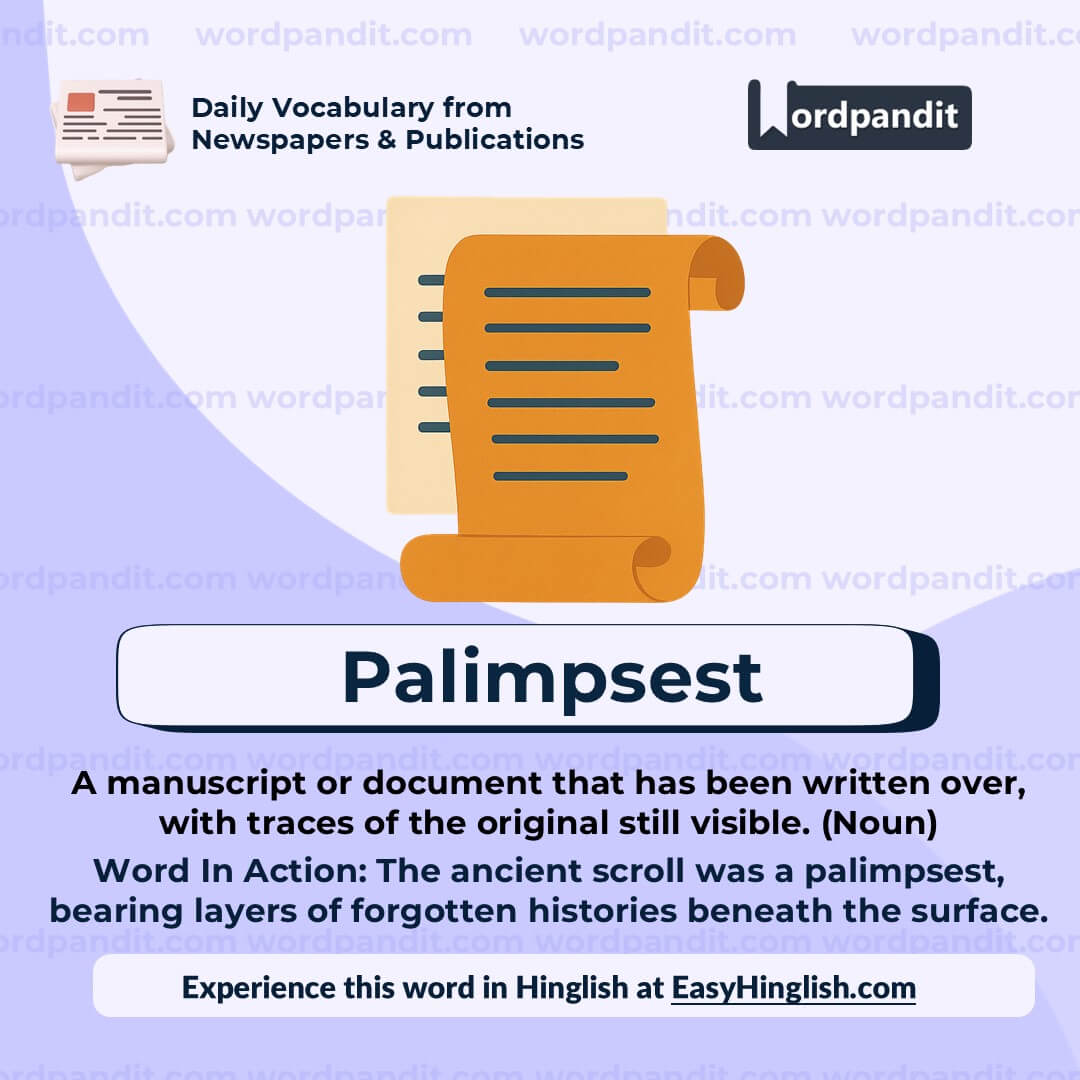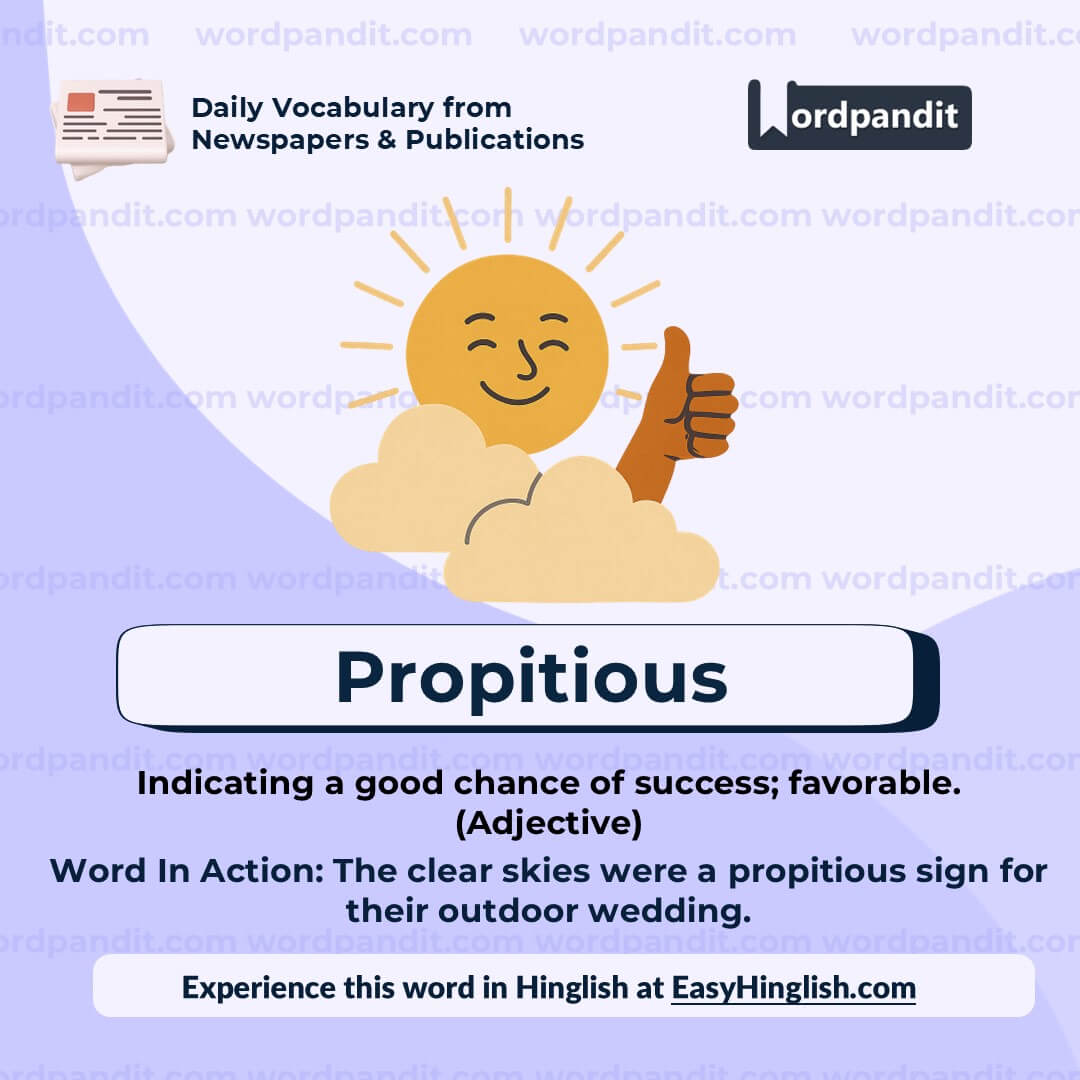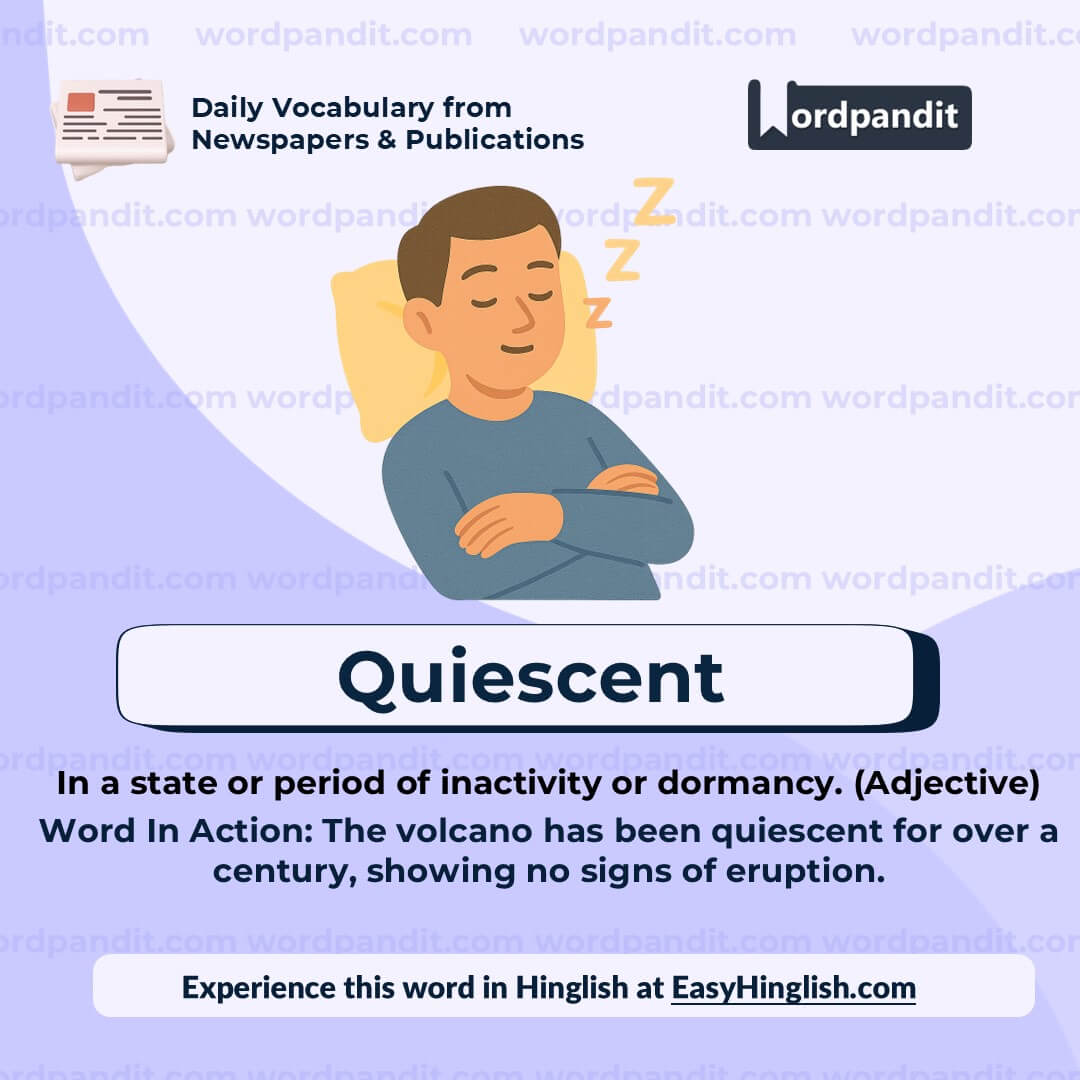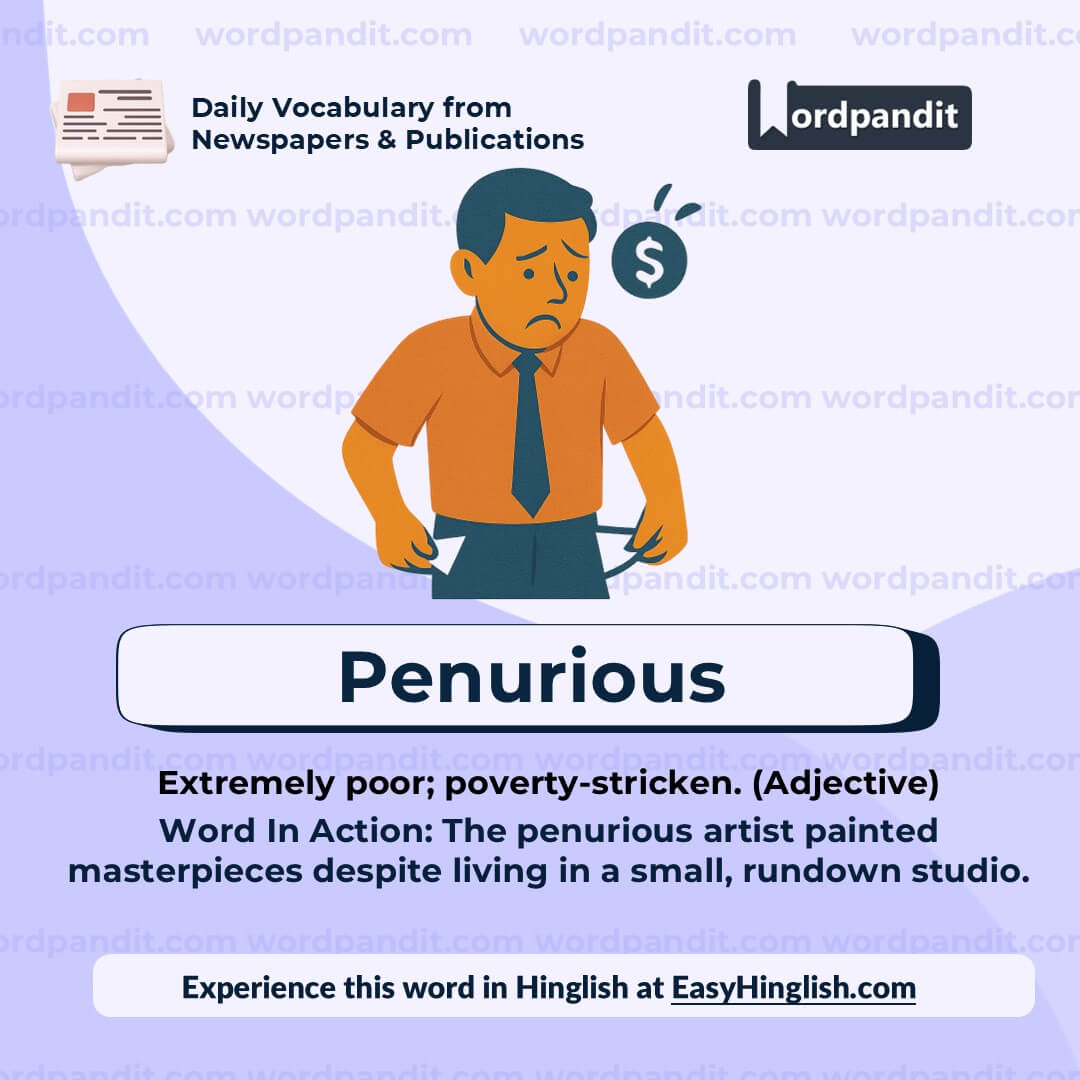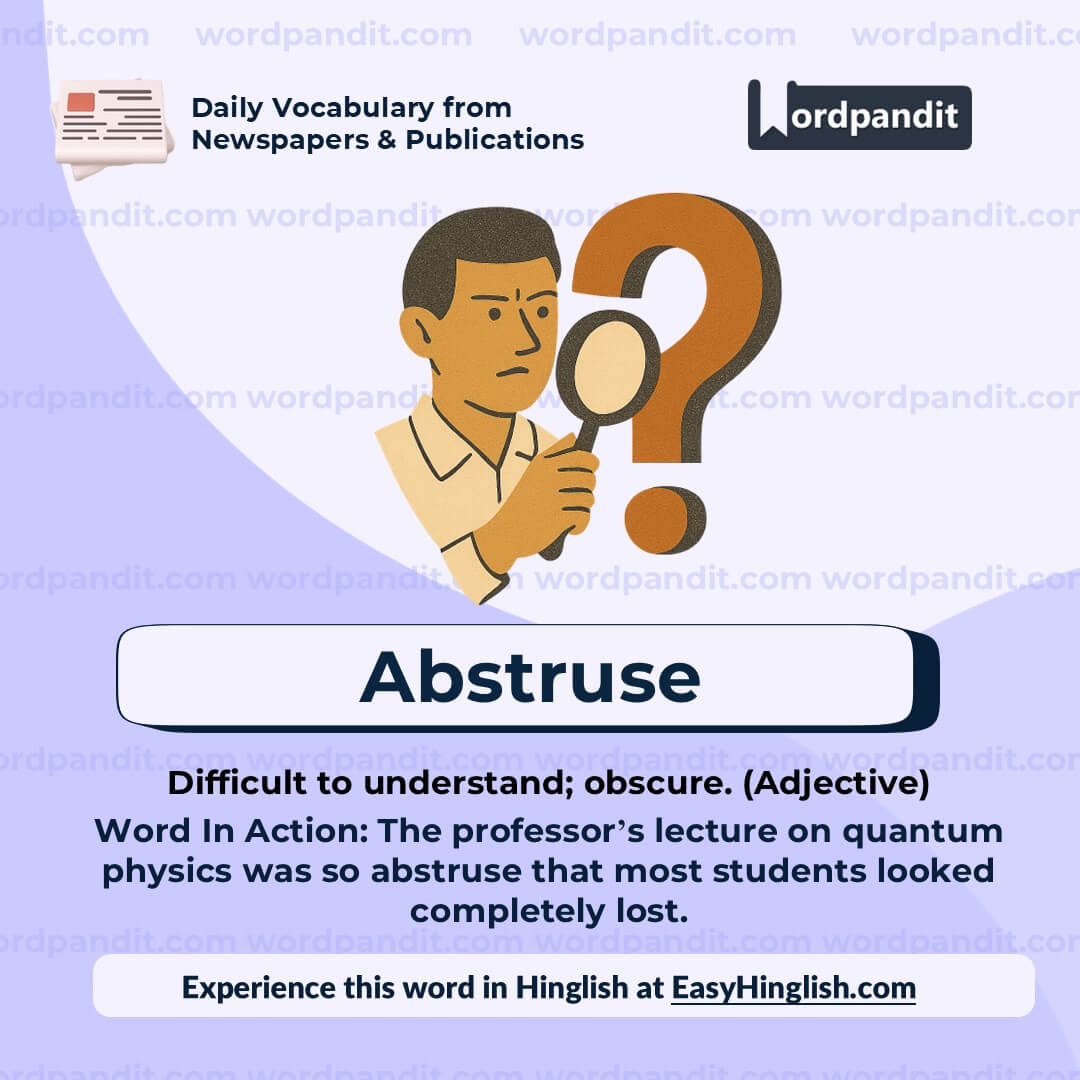Daily Vocabulary from International Newspapers and Publications
Expand Your Vocabulary with Wordpandit’s Global Vocabulary Hub
At Wordpandit, we are committed to helping you develop a truly global vocabulary by drawing from some of the most respected international publications. This section is designed to keep you ahead of the curve by introducing you to words that define global conversations and trends.
The Power of Global Sources
To help you think and communicate on a global scale, we curate vocabulary from renowned international sources, such as:
- The New York Times
- The Washington Post
- BBC
- The Guardian
- The Economist
- Scientific American
- Psychology Today
- And many more...
Stay Global, Stay Competitive
Our daily updates from international publications ensure you are consistently exposed to new words that reflect global news and developments, making sure your vocabulary is not only current but also globally relevant.
Enhance Your Global Perspective
Whether you’re preparing for international exams, aiming to excel in global business communication, or want to enhance your language skills for personal growth, Wordpandit offers the resources you need to thrive in a global context.
Effective Learning, Global Reach
Our learning methodology combines global examples, memory aids, and interactive activities, allowing you to internalize new words effectively and apply them in real-world scenarios.
Begin Your Global Vocabulary Journey Now!
Why Choose Wordpandit?
Practical Learning: Focus on words you'll actually encounter in real-world reading, enhancing your comprehension and communication skills.
Diverse Content: From current affairs to scientific breakthroughs, our varied sources expose you to vocabulary across multiple domains.
Effortless Integration: Make Wordpandit a part of your daily routine. Just a few minutes each day can significantly boost your lexicon over time.
Your Path to Vocabulary Mastery
- Visit our Daily Vocabulary section regularly
- Explore new words and their usage in context
- Practice incorporating these words into your own writing and speech
- Track your progress as your vocabulary expands
Start Your Journey Today
Embark on your vocabulary enhancement journey with Wordpandit. By consistently engaging with our daily posts, you'll build a robust vocabulary that serves you well in academic, professional, and personal contexts.
Remember, a word a day keeps linguistic limitations at bay. Make Wordpandit your daily companion in the quest for vocabulary excellence!
WORD-1: Palimpsest
Context:
"The ancient city exists as a palimpsest, with each civilization building upon the architectural remains of previous cultures." - BBC
Explanatory Paragraph:
A "palimpsest" originally referred to a manuscript page that had been written on, erased, and used again—though traces of the old writing remained. Over time, it has come to describe anything that has layers or traces of previous forms still visible beneath the surface. In a broader sense, cities, ideas, or artworks can all be considered palimpsests when they bear the imprints of different histories or developments over time.
Meaning: Something reused or altered but still bearing visible traces of its earlier form (Noun)
Pronunciation: PAL-imp-sest
Difficulty Level: ⭐⭐⭐⭐ Advanced
Etymology: From Greek *palimpsēstos*, meaning "scraped again"; originally used to describe reused parchment.
Prashant Sir's Notes:
Think of palimpsest as a poetic way to describe anything layered with time—where the past still whispers under the present. Use it when discussing cities, history, memory, or culture that carries remnants of the past.
Synonyms & Antonyms:
Synonyms: layered record, historical trace, overwritten text, reused manuscript
Antonyms: blank slate, clean copy, tabula rasa
Usage Examples:
- The old castle walls are a palimpsest of medieval, Renaissance, and modern architectural styles.
- Her journal was a palimpsest of thoughts—new reflections layered over old emotions.
- Modern Istanbul is a palimpsest of empires, where Roman aqueducts and Ottoman mosques coexist.
- The film’s narrative was a palimpsest, blending timelines and memories into a single storyline.
Cultural Reference:
"History is a palimpsest—layer upon layer of conquest, rebellion, and rebirth." - Adapted from literary historian perspectives.
Think About It:
How do your surroundings or personal beliefs reflect a palimpsest of past experiences or influences?
Quick Activity:
Write a short paragraph describing your hometown as a palimpsest, focusing on how its past is still visible in today's culture, buildings, or traditions.
Memory Tip:
Think of "palimpsest" as a *pale imprint* (PAL-IM), something old that still *persists* (PSEST) beneath the new. Pale + persists = palimpsest!
Real-World Application:
In archaeology, urban planning, and even digital media, "palimpsest" is used to describe environments or systems where traces of the old remain, offering insight into transformation over time.
WORD-2: Propitious
Context:
"Market conditions appear propitious for central bank intervention to stabilize currency fluctuations." - Financial Times
Explanatory Paragraph:
The word "propitious" describes something that is favorable or likely to produce a good result. It is often used when discussing timing, conditions, or circumstances that are especially suited for success. If something is described as propitious, it means the situation is just right and encourages positive outcomes—whether in finance, weather, or even relationships.
Meaning: Favorable or indicating a good chance of success (Adjective)
Pronunciation: pruh-PISH-us
Difficulty Level: ⭐⭐⭐ Intermediate
Etymology: From Latin *propitius*, meaning "favorable, gracious," which came from *pro-* (toward) + *petere* (to seek).
Prashant Sir's Notes:
Use "propitious" when you want to describe the perfect timing or conditions for success. It's great for essays, especially in economics, politics, or even describing luck in everyday life. A high-level word that adds polish to your writing!
Synonyms & Antonyms:
Synonyms: favorable, auspicious, promising, advantageous, opportune
Antonyms: unfavorable, inauspicious, bleak, unpromising
Usage Examples:
- The weather forecast is propitious for the outdoor wedding tomorrow.
- They launched the product during a propitious economic climate.
- It was a propitious moment to ask for a raise—business was booming and morale was high.
- The calm before the negotiations was seen as a propitious sign by diplomats.
Cultural Reference:
"Under a propitious star" is a phrase often used in Shakespearean literature to signify favorable destiny or fate. - Literary idiom
Think About It:
Can a situation be truly propitious if the people involved are unprepared to seize the opportunity?
Quick Activity:
List three moments in your life when the conditions were propitious for success—and describe what made them ideal.
Memory Tip:
Think: "Profit is delicious when conditions are propitious!" Both *propitious* and *profit* suggest favorable conditions.
Real-World Application:
In finance, the term is frequently used to describe market conditions that are favorable for investment or intervention. In everyday usage, it can describe good timing for a job interview, a trip, or any new venture.
WORD-3: Quiescent
Context:
"The volcano has remained quiescent for centuries but continues to be monitored for signs of renewed activity." - Scientific American
Explanatory Paragraph:
"Quiescent" describes something that is currently inactive or dormant, but not permanently so. It suggests a state of calm or stillness, often temporary and potentially followed by movement or action. The word is commonly used in scientific, biological, or geological contexts, such as a sleeping volcano or a quiet phase in cell development. However, it also applies to people or situations that are temporarily inactive.
Meaning: In a state of inactivity or dormancy; quiet and still (Adjective)
Pronunciation: kwee-ESS-uhnt
Difficulty Level: ⭐⭐⭐⭐ Advanced
Etymology: From Latin *quiescentem*, meaning "being still or at rest", from *quies* meaning "quiet".
Prashant Sir's Notes:
"Quiescent" is a great word to use in essays when discussing pauses, dormant states, or anything inactive but not obsolete. Especially useful in scientific writing, philosophical analysis, and even in emotional descriptions (like a quiescent mind).
Synonyms & Antonyms:
Synonyms: inactive, dormant, still, motionless, latent
Antonyms: active, eruptive, lively, dynamic
Usage Examples:
- Though the political scene is currently quiescent, tensions may resurface closer to election season.
- Some species enter a quiescent phase during winter, conserving energy until spring returns.
- Her mind, once racing with thoughts, became strangely quiescent after meditation.
- The economy is in a quiescent state, awaiting stimulus from government policy.
Cultural Reference:
In astronomy, "quiescent galaxies" are those that have stopped forming new stars and remain relatively inactive — a common term in astrophysics journals and NASA briefings.
Think About It:
Can periods of quiescence be more productive in the long run than constant activity? Why or why not?
Quick Activity:
Think of a time in your life that was “quiescent”—write 2-3 sentences describing what made that phase quiet yet meaningful.
Memory Tip:
“Quiescent” sounds like “quiet-sent” — imagine a message sent during silence, or a volcano quietly waiting. QUIET = quiescent!
Real-World Application:
Used in biology to describe cells in a resting phase, in geology for inactive volcanoes, and in everyday speech to describe calm periods in life or systems. It emphasizes temporary stillness.
WORD-4: Penurious
Context:
"Despite growing up in penurious circumstances, she managed to fund her education through scholarships and part-time work." - The Washington Post
Explanatory Paragraph:
"Penurious" refers to extreme poverty or a state of being very poor. It can also describe someone who is extremely frugal or stingy. The word has both economic and behavioral uses: someone might be penurious due to lack of wealth, or they might act penuriously out of reluctance to spend. It's a formal word, often used in biographies or historical contexts to describe hardship and resourcefulness.
Meaning: Extremely poor or unwilling to spend money; miserly (Adjective)
Pronunciation: puh-NYOOR-ee-uhs
Difficulty Level: ⭐⭐⭐⭐ Advanced
Etymology: From Latin *penuria* meaning "need, scarcity", which is also the root of the word "poverty".
Prashant Sir's Notes:
"Penurious" carries a formal, somewhat literary tone. Use it to elevate descriptions of poverty or tight-fisted behavior. Especially powerful in essays or stories about resilience or economic disparity.
Synonyms & Antonyms:
Synonyms: impoverished, destitute, needy, miserly, stingy
Antonyms: wealthy, affluent, generous, well-off
Usage Examples:
- The penurious old man refused to spend money even on heating in the dead of winter.
- She came from a penurious background but never let her circumstances define her future.
- His penurious habits stemmed more from fear than necessity.
- Government assistance programs aim to support citizens living in penurious conditions.
Cultural Reference:
In Charles Dickens’ novels, many characters like Pip or Oliver Twist start their lives in penurious situations, reflecting the harsh social conditions of Victorian England.
Think About It:
Is being penurious always a result of external circumstances, or can it also be a mindset shaped by past experiences?
Quick Activity:
Write two sentences—one where "penurious" describes a person’s financial situation, and one where it describes a person’s behavior or attitude.
Memory Tip:
“Penurious” sounds like “penny-urious” — think of someone so poor they are curious about every single penny!
Real-World Application:
"Penurious" is used in academic writing, biographies, and journalism to describe lives marked by poverty or extreme frugality. It conveys depth and often evokes empathy or social awareness.
WORD-5: Abstruse
Context:
"The paper was criticized for presenting relatively straightforward concepts in abstruse language inaccessible to policymakers." - The Economist
Explanatory Paragraph:
"Abstruse" describes something that is difficult to understand, especially because it is overly complex, abstract, or obscure. It’s typically used for academic, philosophical, or technical language that might confuse a general audience. If something is abstruse, it may require specialized knowledge or extra effort to fully comprehend, making it a red flag for unclear or inaccessible writing.
Meaning: Difficult to understand; obscure or complex in nature (Adjective)
Pronunciation: ab-STROOSS
Difficulty Level: ⭐⭐⭐⭐ Advanced
Etymology: From Latin *abstrusus*, meaning "hidden" or "concealed", from *ab-* (away) + *trudere* (to push).
Prashant Sir's Notes:
"Abstruse" is a favorite in academic criticism—especially when talking about writing that's too complicated for its audience. Use it to critique dense papers, theoretical lectures, or any material that seems unnecessarily complex.
Synonyms & Antonyms:
Synonyms: obscure, complex, perplexing, arcane, esoteric
Antonyms: clear, straightforward, simple, accessible
Usage Examples:
- The professor’s lecture was filled with abstruse theories that confused even advanced students.
- He enjoyed reading abstruse philosophical essays, even when they made little practical sense.
- The legal document was so abstruse that she had to hire a lawyer to interpret it.
- The novel’s abstruse narrative style discouraged casual readers from continuing past the first chapter.
Cultural Reference:
Philosopher Martin Heidegger is often cited for his abstruse writing style, with dense and complex prose that challenges even expert readers.
Think About It:
Should writers be responsible for simplifying abstruse ideas, or should readers be expected to rise to the challenge of complexity?
Quick Activity:
Find a sentence from a textbook or article that feels abstruse. Rewrite it in simpler language without changing the meaning.
Memory Tip:
Think: “Abstract + Confuse = Abstruse” — when something is abstract and confusing, it’s probably abstruse!
Real-World Application:
"Abstruse" is often used in critiques of academic, legal, or bureaucratic writing that is overly complicated. It's a useful word for identifying barriers to effective communication.



